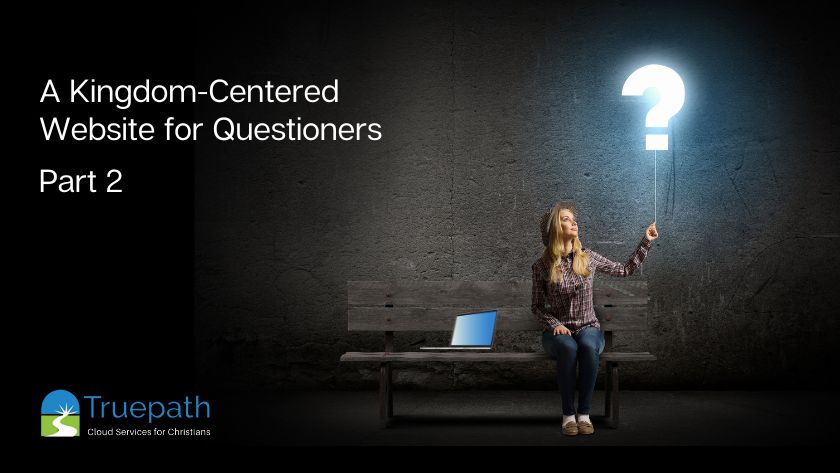A Kingdom-Centered Website for Questioners – Part 2
by Stephen Trout
Lauren Whitman’s daughter was excited about her class hike through a nature preserve – until her glasses disappeared.
She’d hung them on her collar in order to peer through her binoculars; but when the hike was over, the glasses were gone. To make matters worse, a sudden downpour swept in, making it even less likely the glasses would be found!
Afterward, Lauren recalls their conversation:
“…as she and I trudged along the muddy paths, I was trying to carry the mantle of hopefulness for our little two-member search party. “Look along the edges of the path!” “Keep praying!” “Keep your eyes on the ground!”
But when we reached the end of the route that her class had traversed without spotting the glasses, discouragement started to set in.”
Can’t we relate? What a perfect metaphor for the journey of faith: we’re moving along fine, enjoying the scenery. Suddenly trouble comes. Things get cloudy; we lose our vision.
Such experiences are common to us all. But what we do next – as Lauren notes – isn’t always approved – either by us, or others.
“As we turned around to go the same way back and comb back over the same terrain, my daughter’s questions started.
“Why doesn’t God just send angels to show us where the glasses are?”
Good question! “He certainly could do that,” I replied cheerfully.
A few minutes later: “Why doesn’t God just end all the sin in the world right now?”
A deeper question—and much harder to answer! I could see her logic: a hardship like losing your glasses is connected to a world that isn’t fully redeemed.
We continued to talk and look, look and chat. And when we found the glasses several minutes later—yes, we found them!—I noticed that I felt a little disappointed.
We were happy, of course, but a simultaneous feeling of disappointment after receiving the blessing of an answered prayer? Curious. Yet I understood it: finding her glasses meant we’d now head home and switch gears. With the glasses found, the tension she had been wrestling with— We’re praying. I know God can answer, but will he?—was resolved.
My disappointment indicated just how much I valued that she was asking questions about her faith—so much so that I would’ve gladly kept looking for the glasses to give her more time to wrestle with that tension!”
Questions & Wrestling are Scripture’s Model
For many, expressing questions about God’s ways in our lives can seem like a weakness. “If you were really walking in faith,” they say, “you’d respond differently. Say ‘Praise the Lord anyway,’ and move on.”
But is that really what we’re called to? Are we meant to just passively or stoically accept whatever comes our way, without ever voicing our pain, or processing aloud what God is doing?
Whitman says that on the contrary, questions (like her daughter’s) are actually a sign of honest engagement with God, and of being human.
Do we question this? Notice the numerous examples in Scripture that show God’s people – and even the perfect human, Christ himself (“My God, My God, why have you forsaken me?”) – questioning in the midst of suffering and pain.
God includes questions like these in His Word, Whitman notes, to validate emotional engagement:
“Why, Lord do you stand far off? Why do you hide yourself in times of trouble?” (Psalm 10:1–2)
“How long, O Lord, will you forget me forever? (Psalm 13:1)
“How long, Lord, must I call for help, but you do not listen?” (Habakkuk 1:2)
“Why do you make me look at injustice? Why do you tolerate wrongdoing?” (Habakkuk 1:3)
Our Ministry and Website
As we saw last week, we all have questions about God’s ways and his love, our guilt and shame, and whether we’ll be accepted. They’re natural in a fallen world.
Loneliness and despair may be understandable apart from knowing God as Father; yet even believers can “lose their glasses” and struggle with difficult providences.
In addition, we are strugglers with sin, often doing the things we don’t want to do (as Paul himself said in Romans 7).
Yes, it’s true that there is no condemnation in Jesus (Romans 8) – but are we honest about the struggle? Do we validate for others?
So we need to ask a pertinent question: Do we make space – in our relationships as well as on our websites – for those kinds of questions?
- Are you feeling alone?
- Hopeless?
- At the end of your rope?
- Helpless, possibly in the face of injustice?
- What are you struggling with, and believing about your situation?
Perhaps we don’t ask because we’re not ready for the answers!
And so we opt for a glittering image of Christianity, everyone smiling and happy, all the time. And if they’re not, well they just need to “pull themselves up by their bootstraps” and fix things.
This is hardly an honest portrayal of the Christian life – life in God’s kingdom of grace. Nor is it a picture of the relational love to which we’re called.
We’ve said it before, and it bears repeating: we tend to want to change our circumstances, but God wants to change our hearts.
This is critical, because circumstances and sufferings may not change. A restored vision to see “a big God” who is with us is what we all need most.
This way, when we do face the fire and the storm, we will not ultimately be overcome, for we know and trust that the Lord is with us (Isa. 43).
Let’s end with some final words from Lauren:
“The very essence of faith is believing in what we can’t see (Hebrews 11:6). That’s not easy to do! We live in a world that’s not our home, where all things haven’t been made right. And in this place, trusting God is not a given. The hope is that greater trust comes on the other side of asking questions. And that is indeed the goal when we wrestle with our uncertainties: that our love for God would increase, and that, after our wrestling, we’d be left with a deeper sense that true rest will only be found with him… when you are struggling with doubts and hard questions, find a trusted person to voice them to, someone who will value them. Wrestle through them together. Pose them to God directly, as the psalmists did—and as Jesus himself did (Psalm 22:1). And be encouraged that your questions are a sign of a living, engaged faith.”
Lauren Whitman is a counselor with the Christian Counseling and Education Foundation (CCEF). Her original article can be found here.


